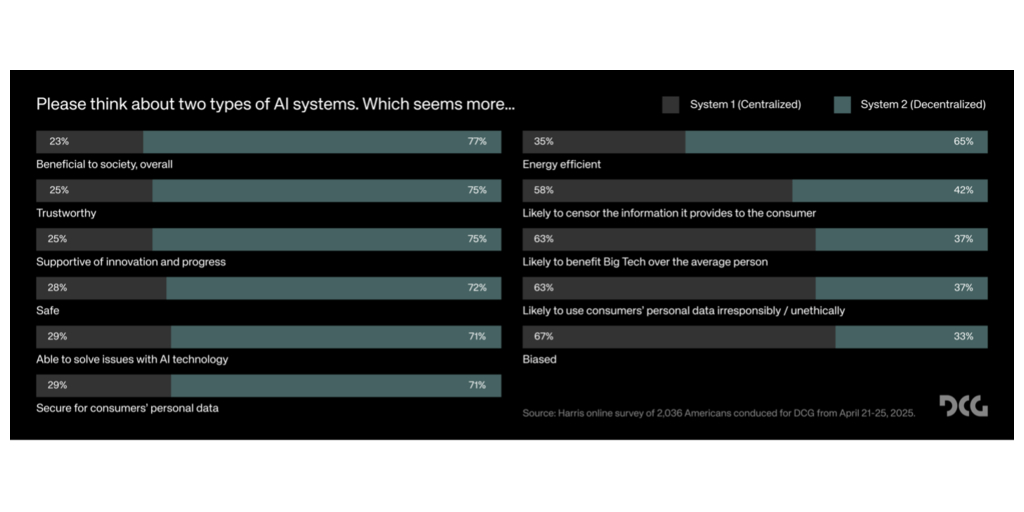New Harris Poll commissioned by DCG reveals strong public support for decentralized AI, with consumers urging policymakers to adopt regulations that foster innovation and protect data security
WASHINGTON--(BUSINESS WIRE)--DCG, a global investor, builder, and incubator of decentralized ecosystems, today unveiled the results of a new study conducted in partnership with The Harris Poll, revealing that 75% of consumers believe decentralized AI is more likely to support innovation and progress than centralized AI.1 The survey, which polled 2,036 U.S. respondents, including registered voters and AI users, provides insight into growing sentiment favoring decentralized approaches to artificial intelligence, signaling strong support for the emerging sector of decentralized AI (deAI).




“This research makes it clear: there’s strong public support for policies that both protect innovation and keep pace with where the world is headed. Three-quarters of Americans agree that the transformative power of AI would benefit more people if it wasn’t consolidated in the hands of a few major players,” said Julie Stitzel, Senior Vice President of Policy at DCG. “Just as we’ve done in digital assets, we’re committed to working hand-in-hand with policymakers to shape thoughtful, balanced rules that foster the growth of decentralized systems, which are opening access to intelligence in the same way that the internet first opened access to information.”
The poll is released alongside the DCG Fly-In, a two-day event held last week in Washington, D.C., bringing together DCG, its portfolio companies, and key U.S. lawmakers to discuss decentralized AI, privacy, energy, and pending market structure and stablecoin bills. During the event, DCG co-hosted a deAI briefing with the bi-partisan House Congressional Crypto Caucus, and one Fly-In participant testified before the House Natural Resources Subcommittee of Investigations and Oversight about decentralized solutions for AI energy challenges.
DeAI is a model combining artificial intelligence with blockchain technology to democratize access, enhance transparency, and ensure privacy in AI systems, which was Americans’ single largest concern with AI according to polling data. Unlike traditional AI controlled by a few large entities, deAI offers economic incentives and distributes control to contributors across a decentralized network such as Bittensor, enabling equitable access to AI systems’ benefits and reducing risks such as bias and privacy concerns.
"The public is calling for a new social contract with artificial intelligence: one where AI is governed openly, distributes value fairly, and gives people a meaningful stake in the systems that shape their lives,” said Tony Douglas, Co-Founder, Decentralized Research Center. “Decentralization is no longer a fringe idea, it’s a framework for building AI that reflects public values and a chance to avoid repeating the failures of the last tech era."
Compelling findings from the survey include:
Consumers are optimistic about AI’s potential, but demand stronger personal oversight.
- 88% agree that if AI is using their personal information and data, they should have more control over what is being used.
- A majority of consumers (59%) agree that AI is becoming as essential as the internet, and that it should therefore be accessible to the public without heavy regulation.
Public appetite is growing for AI beyond Big Tech’s constraints.
- Big Tech companies are one of the least trusted groups when it comes to decision-making regarding AI use and development, surpassed only by elected officials.
- 77% of consumers see deAI as more beneficial to society overall than centralized AI.1
- 72% would be more willing to use AI if there were more alternatives to the systems controlled and developed by Big Tech.
- Two thirds (67%) of consumers see centralized AI as more biased than deAI.1
Voters are looking for alternatives to centralized AI.
- A majority of voters (56%) prefer deAI over centralized AI.
- A majority of both Republicans and Democrats prefer deAI over centralized AI.
DeAI and decentralized systems are more favorable to consumers.
- 71% see deAI as more secure for consumers’ personal data than centralized AI.1
- Three-quarters (75%) see deAI as more supportive of innovation and progress than centralized AI.
- A vast majority (86%) of Americans already see the benefits of AI in their daily lives, and 74% agree that they’d be more comfortable using AI if they knew they could benefit from the use of their personal data.
- A majority of AI users show preference for deAI over centralized AI.
The complete survey findings, along with detailed analysis and recommendations, are available at dcg.co/poll.
DCG remains committed to collaborating with policymakers, community leaders, and stakeholders to foster a more inclusive and resilient financial system and is actively focused on the growth of decentralized ecosystems, including the decentralized Bittensor network through the recent launch of its subsidiary Yuma. Yuma supports early-stage teams building on Bittensor, providing capital, technical support, community access, and long-term collaboration to help launch and grow subnets. Through its accelerator, incubator, validator, and mining roles, Yuma helps shape a more open and accessible future for AI. DCG and Yuma own $TAO, the native token of the Bittensor ecosystem, and may hold interests in projects built on or supporting Bittensor and other deAI ecosystems.
About DCG
Founded in 2015 by Barry Silbert, DCG is a global investor, builder, and incubator committed to advancing decentralized ecosystems built on blockchain technology. As the most active investor in the space, DCG has backed over 250 early-stage technology companies across 40 countries and holds more than 70 token and digital asset investments. In addition to its investment portfolio, DCG is the parent company of subsidiaries including Grayscale, Fortitude Mining, Foundry, Luno, and Yuma. For additional information about DCG, visit www.dcg.co.
The Harris Poll Method Statement
The research was conducted online in the U.S. by The Harris Poll on behalf of Digital Currency Group among 2,036 U.S. adults aged 18 years or older. The survey was conducted between the 21st of April and the 25th of April.
Data are weighted where necessary by age by gender, race/ethnicity, region, education, marital status, household size, employment, household income, political party affiliation, and voter registration status to bring them in line with their actual proportions in the population.
Respondents for this survey were selected from among those who have agreed to participate in our surveys.
The sampling precision of Harris online polls is measured by using a Bayesian credible interval. For this study, the sample data is accurate to within ± 3.0 percentage points using a 95% confidence level. This credible interval will be wider among subsets of the surveyed population of interest.
All sample surveys and polls, whether or not they use probability sampling, are subject to other multiple sources of error which are most often not possible to quantify or estimate, including, but not limited to coverage error, error associated with nonresponse, error associated with question wording and response options, and post-survey weighting and adjustments.
1 Opinion of the general public when shown blinded descriptions of Decentralized AI and Centralized AI
Contacts